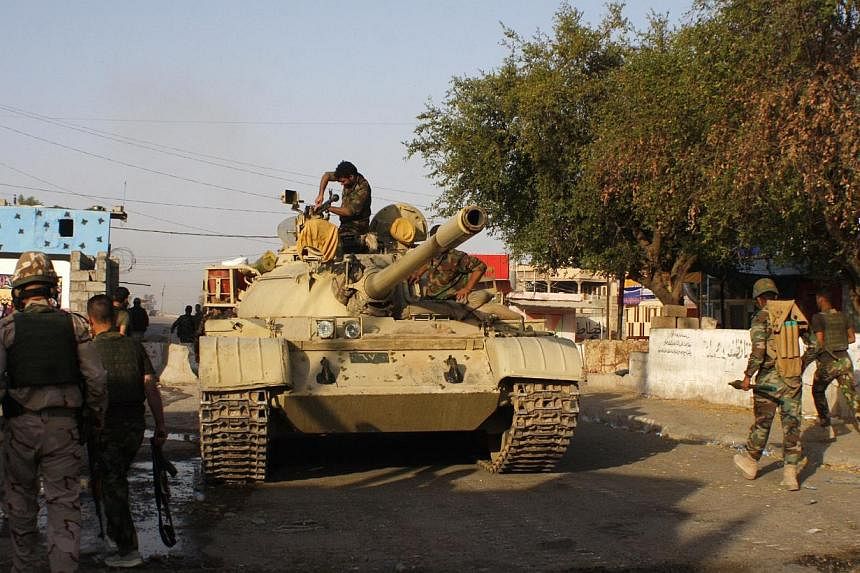SULAIMANIYAH, Iraq (AFP) - Jihadists raised their black flag in Iraq's northern town of Sinjar on Sunday in a second-straight day of advances against Kurdish forces, sparking mass displacement the United Nations called a humanitarian tragedy.
The Islamic State's (IS') capture of Sinjar raised fears for minority groups that had found refuge there and further blurs the border between the Syrian and Iraqi parts of the "caliphate" which the IS declared in June.
"The (Kurdish) peshmerga have withdrawn from Sinjar, Daash has entered the city," Kurdish official Kheiri Sinjari told AFP, using the former Arabic acronym for the IS. "They have raised their flag above government buildings," the Patriotic Union of Kurdistan (PUK) party official said.
Other officials confirmed the fall of the town between the Syrian border and Mosul, which is Iraq's second city and has been the IS hub there since it launched a major onslaught on June 9.
"The peshmerga have withdrawn to mountain areas and are getting reinforcements," a high-ranking peshmerga source said.
Sinjar had sheltered thousands of people who were displaced by the huge offensive IS launched in the region nearly two months ago.
Among them are many of Iraq's minorities, such as Turkmen Shiites who fled the city of Tal Afar, about half-way between Sinjar and Mosul, when jihadist fighters swept in.
Sinjar is also a historical home for the Yazidis, a Kurdish-speaking minority that follows a pre-Islamic faith derived in part from Zoroastrianism.
IS militants refer to them as devil worshippers and they have been repeatedly targeted.
"A humanitarian tragedy is unfolding in Sinjar," the top UN envoy in Iraq, Nickolay Mladenov, said.
The capture of Sinjar prompted thousands of families - up to 200,000 people, according to the UN - to flee, many of them into the neighbouring mountains.
"The United Nations has grave concerns for the physical safety of these civilians," Mladenov said, as they risk being stranded with no supplies in roasting temperatures and surrounded by jihadists.
A Kurdish official and several other sources also said that IS fighters had destroyed the small Shiite shrine of Sayyeda Zeinab shortly after taking control of Sinjar.
Sinjar in normal times had an estimated population of 310,000.
The jihadist group, which effectively controls much of Iraq's Sunni heartland, posted pictures on the Internet of its forces patrolling Sinjar's main street.
The push on Sinjar by IS fighters came a day after the jihadists seized control of Zumar, another town to the northeast, which had also been under peshmerga control.
The Sunni militants also seized two nearby small oilfields which a North Oil Company official said had a combined capacity of 20,000 barrels per day.
Both Sinjar and Zumar are areas that the Kurdish peshmerga moved into in June.
They filled a security vacuum left by retreating Iraqi government forces, while grabbing land the Kurds had long coveted and were in dispute with Baghdad over.
The peshmerga are widely perceived as Iraq's best organised and most efficient military force, but the autonomous Kurdish region has been cash-strapped and its troops stretched.
Its regional government has not been receiving the 17 per cent share of national oil revenues it is owed by Baghdad and is struggling to sell its own, smaller, production independently.
According to a senior official, a Kurdish delegation is currently in the United States to demand military equipment.
Such procurement theoretically requires the approval of the central government in Baghdad, where politicians are expected to renew efforts to form a government this week.
Lawmakers in parliament's Shi'ite majority have until Friday, in principle, to pick their nominee for prime minister.
Incumbent Nuri al-Maliki seems intent on hanging on for a third term, but his support base, including within his own Dawa party, has crumbled since his coalition comfortably won April elections.
Many key domestic and international players in the ongoing conflict, which has killed thousands and displaced more than 600,000, have made it clear that any organised fightback against IS could start in earnest only if Mr Maliki steps aside.
With the backing of Shi'ite militia, government forces have since June managed to protect key towns and facilities, but they have failed to deal any significant blow to the jihadists.

